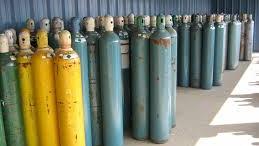Compressed Gas Safety
Compressed Gas Safety Video
Table of Contents
This video covers the safe handling of compressed gas cylinders. It presents detailed guidelines used by industry, it reviews the hazards associated with compressed gases, and outlines a series of best practices for compressed gas safety. It also presents Best Practices related to compressed gas safety in a commercial laboratory setting.
Video – Compressed Gas Safety [11:10]
This video is a compilation of three safety videos from various sources. It addresses handling of compressed gases, safety procedures, and laboratory practices for handling compressed gases.
Compressed Gas Safety
Unless you have been trained to safely handle compressed gas cylinders, you should avoid working with or around them. Those workers who are trained in the proper handling techniques are much less likely to suffer injuries and medical complications. Compressed gas cylinders are heavy and awkward to move for untrained and inexperienced people/employees. When inexperienced or untrained workers improperly handle cylinders, they are at risk on injuries such as sprains, strains, bruises or broken bones. The following is a detailed guide on the best practices and industry standards to avoid these injuries.
Basic safety practices for handling compressed gas cylinders
Store cylinders properly
It is best to keep cylinders away from direct sunlight, sources of flame or sparks, and out of areas with high temperatures. Always store the cylinders in groups. These groups should be determined by the hazards the contents of the cylinder pose.
It is also important to remember that acetylene cylinders are unique and must always be kept vertical. This is because acetylene is inherently unstable and may break down into liquid form. The liquid acetone could leak through the valve and create a fire hazard. This will also affect the quality of the gas.
Keep cylinders secured
When a cylinder falls over, it can easily crush a foot, damage machinery or a number of other problems. Always make sure to properly secure cylinders with straps, guards, or chains. Never remove the cap from a cylinder until it has been secured.
Always inspect cylinders before moving or using
The person transporting the gas cylinders are the first line of defense against problems. When you pay attention to the condition of the cylinders and valves, it minimizes the chances that an accident will occur.
Open them carefully
When it comes to using the cylinders, take your time before opening the valves. After inspecting the cylinder, open it slowly. When you open the cylinder quickly, you can damage the regulator and valves due to high pressure.
Sticking to these guidelines will help reduce the number of cylinder related accidents in the work area.
Compressed Gas Safety Continuing Education Courses
If Compressed Gas Safety is of interest to you, consider our continuing education courses that address this subject directly.
HS-02-101 Compressed Gas Safety – 2 PDH
This course reviews the hazards associated with compressed gases and the cylinders used to store them – both chemical and physical, and presents a framework for identifying risk. Worker responsibilities are presented along with safety measures to protect them from injury. It emphasizes hazard identification and safe work practices that apply to all compressed gas operations.
HS-02-101W Live Webinar: Compressed Gas Safety – 3 PDH
This Live Webinar course reviews the hazards associated with compressed gases and the cylinders used to store them – both chemical and physical, and presents a framework for identifying risk. Worker responsibilities are presented along with safety measures to protect them from injury. It emphasizes hazard identification and safe work practices that apply to all compressed gas operations.


Since my cousin is planning on starting his own medical clinic and will be in need of buying bulk commercial compressed gasses, I thought I’d help him out by finding out how to store them safely. It’s great that I found this article, as it really taught me a lot of things didn’t know. I’ll be sure to find a nice covered room in his clinic where I can store them away from any possible hazards. Compressed gasses can be really dangerous and since my cousin is a bit carefree with his stuff, I’ll do my best to make sure he stores them properly once he buys some for his clinic.